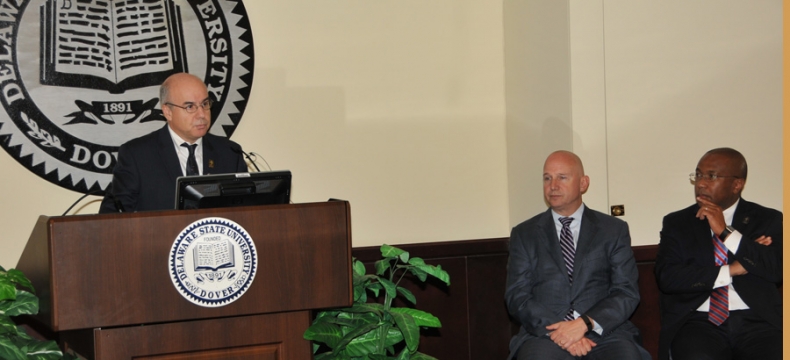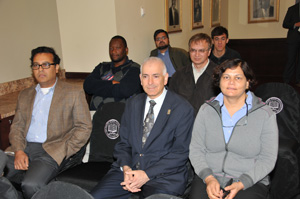
DSU OSCAR Awarded New $5M NASA Grant
Delaware State University has recently been awarded a $5 million grant for a NASA research and education program that will continue its partnership with the space agency.
|
|
Built on the success of a previously NASA-funded program at DSU, this new program will strengthen the partnerships and collaborations with the Los Alamos National Laboratory, the Goddard Space Flight Center and the University of Delaware; enhance the research capabilities at DSU; and provide a rich intellectual environment for training our students.
Dr. Noureddine Melikechi, Distinguished University Professor of Physics, founder of the University’s Optics Research Program and director of the Optical Science Center for Applied Research (OSCAR) at DSU, is the principal investigator of the grant.
“It is with great pride that DSU will continue to be connected to NASA’s Mars mission through the work of Dr. Noureddine Melikechi and OSCAR,” said DSU President Harry L. Williams. “The research funded by this grant will not only make its mark on the world, but far beyond it on the Red Planet.”
The program includes four major research projects on developing optics-based space science technologies.:
- Dr. Melikechi along with Dr. Yuri Markushin and Dr. Jun Ren, professors at DSU, and Dr. Roger Wiens of Los Alamos will lead the efforts to develop new optical technologies for space exploration – of major relevance to the ongoing (2012 and 2020) NASA MARS exploration missions.
- Dr. Renu Tripathi, associate professor of physics, and her team will develop a ground-based sodium-Lidar instrument in collaboration with Goddard scientists. This instrument will be used to perform high-resolution time and space measurements of the atmospheric sodium density, temperature, and vertical wind velocity from the mesosphere region of the atmosphere. The study will provide critical understanding of radiative cooling in the mesosphere, which is highly relevant to NASA’s Heliophysics Science Goals.
- In collaboration with Goddard researchers, Dr. Amir Khan and Dr. Hacene Boukari aim to develop the next generation of infrared-based technologies for ultrasensitive detection of chemicals present in the atmospheres of planets. Some of these chemicals could be associated with the presence of life.
- The fourth project – led by Dr. Mukti Rana, chair of the Department of Physics – seeks to design and fabricate an infrared detector that does not need an active cooling system, which would be a major step in the development of low-cost, high-performing, and low-weight detectors suitable for future space flights.
"The Optics Program at Delaware State University continues to make strides in research and development, and this grant from NASA will help it go even further in its goal of enhancing space exploration," said U.S. Sen. Tom Carper. "They are putting the school - and Delaware - on the map when it comes to optical research, and helping the school become a hub for Kent County economic development."
U.S. Sen. Chris Coons said this NASA grant an imperative for the scientists to continue their leading edge research in the newly completed OSCAR building. “I know many hours of hard work by he and his team went into researching and preparing for this award, but now the real work begins, as his team embarks on several research projects over the next five years,” Sen. Coons said.
Dr. Matt Bobrowsky, OSCAR’s director of Special Programs, will lead the education and outreach component of the project, which includes programs for both university students and pre-college students, including nationwide outreach to ensure geographic diversity in DSU’s educational marketing and outreach efforts. The education plan is consistent with NASA’s Strategic Plan, which includes the cultivation of scientific literacy and a strong future workforce through STEM education, with particular efforts to include those in historically underrepresented groups.
Gov. Jack Markell said that DSU understands the tremendous value in providing its students and faculty with access to leading edge tools and technology. “OSCAR is a testament to DSU’s commitment and this NASA grant will support the University’s efforts,” Gov. Markell said. “We congratulate DSU on this award and are excited to see the results of their research in the coming years.”
Through OSCAR, the optics program at DSU has had long-standing relations with NASA’s Mars Mission through Dr. Melikechi’s work as a member of the mission’s ChemCam team. The ChemCam technology installed on the Mars Rover – which landed on Mars in 2012 and subsequently did laser-based analysis of the Red Planet rocks and soil – sent data back to Earth, which Dr. Melikechi and Dr. Alissa Mezzacappa (recently awarded her Ph.D. for work on this topic) worked on with their colleagues from ChemCam.
U.S. Rep. John Carney this latest NASA grant reinforces DSU’s well-earned position as a leader in the field of optics and photonics technologies.
“Because of this funding, OSCAR scientists will continue to be on the front lines of space exploration, including NASA’s next Mars mission,” Rep. Carney said. The grant also enhances DSU’s standing as a world-class educational institution that prepares some of our brightest young people for careers in this field.”


 OSCAR scientists listen to the announcement of the $5 million NASA grant.
OSCAR scientists listen to the announcement of the $5 million NASA grant.